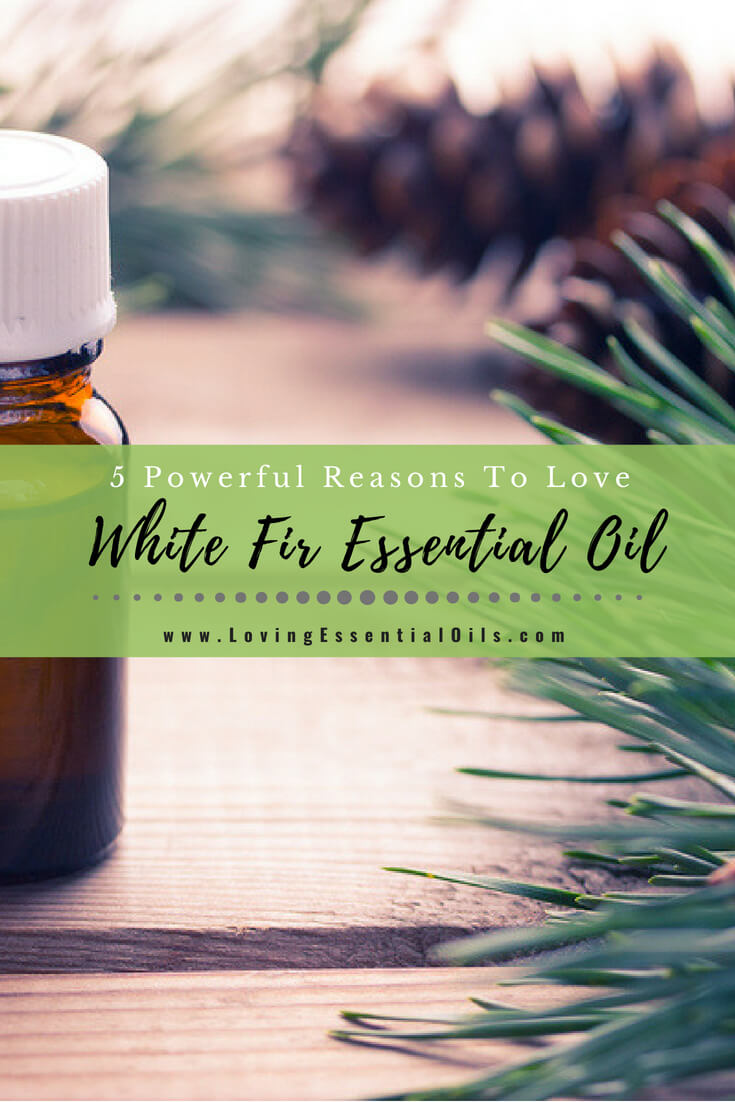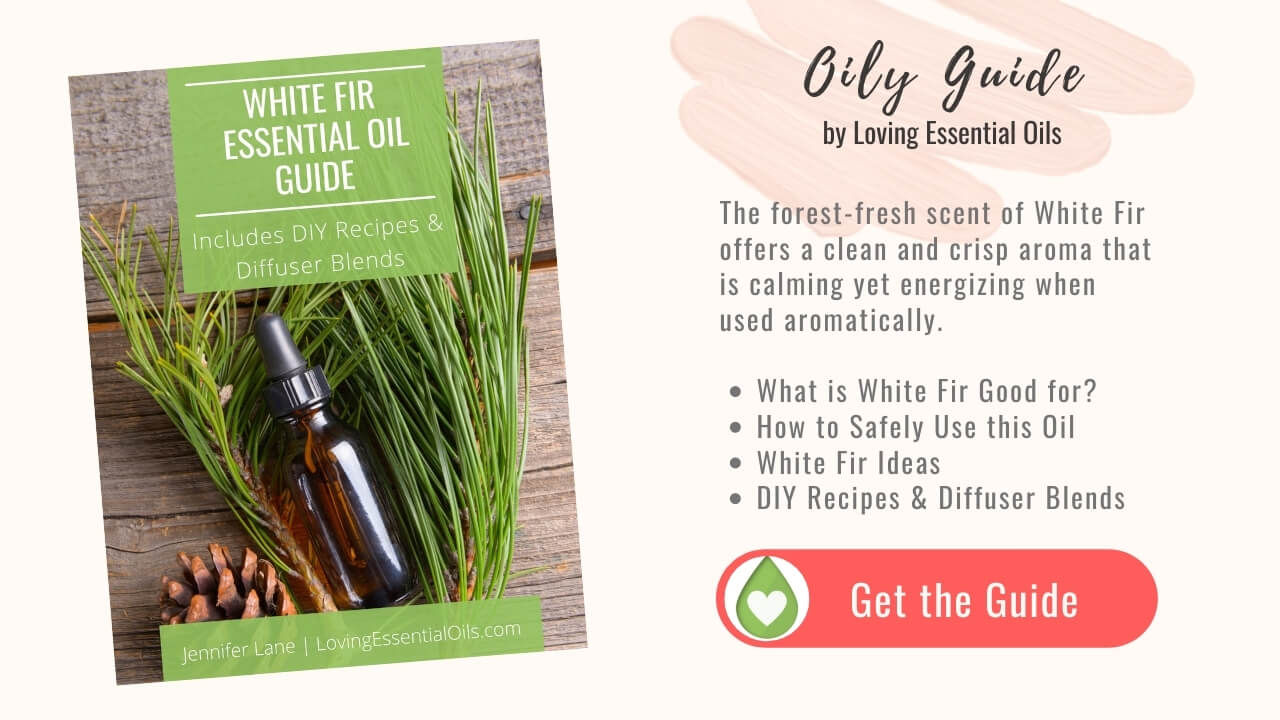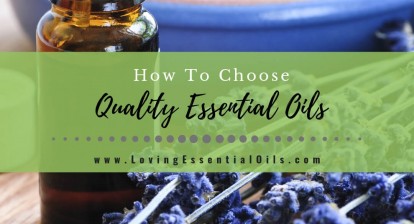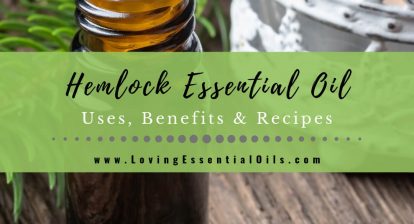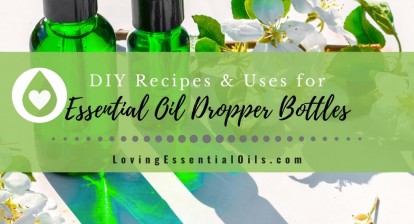Have you ever used white fir essential oil? The uplifting, forest-fresh scent of white fir essential oil will have you reminiscing of a wooded forest. This potent essential oil offers a clean and crisp aroma that is calming yet energizing when used aromatically.
I love using white fir essential oil. It’s a versatile oil that I use in many DIY essential oil recipes like diffuser blends, homemade perfumes, massage oils, room sprays, foaming soaps and aromatherapy inhalers.
Let this uplifting essential oil induce a calm feeling and evoke positive thoughts. Use a few drops in an aromatherapy diffuser or rub on skin with jojoba oil to comfort the body after a strenuous workday.

White Fir Essential Oil Facts
White fir is also known as silver fir, silver spruce or fir needle oil. The botanical name is abies alba. Another botanical name I have seen used for white fir is abies concolor.
The pine scented oil is a popular ingredient in perfumes, bath products and aerosol inhalants. Historically, fir oil has been used for respiratory complaints, fever, muscular pain and rheumatic treatment. Silver fir was initially chosen as the primary Christmas tree species but has since been overshadowed by other varieties.
- Botanical Name: Abies alba, abies concolor
- Botanical Family: Pinaceae
- Aka/Synonyms: Silver fir, Silver spruce or Fir needle oil
- Blending Note: Top
- Aromatic Profile: Woody, fresh, coniferous, earthy
- Extraction Method: Steam distilled
- Plant Part Used: Needles and twigs
- Shelf Life: 2 – 3 years
- Color/Consistency: Thin, clear
- Safety Concerns: Considered okay for kids. Avoid old or oxidized oils, they may cause skin sensitization. Store oil in dark, airtight container out of reach of children and pets. Not phototoxic.
Main Constituents of White Fir:
Limonene, B-pinene, bornyl acetate. See Essential Oil Safety for a complete list of constituents.
White Fir Essential Oil Blends Well With:
There are many oils that White Fir blends well with, this is not an exhaustive list, just some suggestions:
- Peppermint
- Spearmint
- Wintergreen
- Cinnamon
- Ginger
- Douglas Fir
- Cypress
- Frankincense
- Balsam Fir
- Lavender
- Lemon
- Orange
- Cedarwood
- Patchouli
Therapeutic Uses:
Catarrh, sinusitis, bronchitis, bronchial tract discomfort, dry cough, rheumatism, muscular aches and pains, feverishness, anxiety, tension, general tonic. (from The Complete Book of Essential Oils and Aromatherapy by Valerie Ann Wormwood, page 588)
Arthritis, muscular aches and pains, rheumatism. Bronchitis, coughs, sinusitis. Colds, fever, flu. (from The Encyclopedia of Essential Oils by Julia Lawless, page 92-93)
White Fir Essential Oil Uses and Benefits
This oil can be enjoyed by both aromatic and topical application can provide many health benefits and uses for You can find white fir essential oil recipes and blends below, as well as the benefits and uses.
1. Relieves Overexercised Muscles
White fir essential oil can be useful after strenuous activity or vigorous exercise. The anti-inflammatory properties found in this oil can soothe inflammation. It may be beneficial for reducing muscle pain and fatigue.
Create a Post Workout Massage Oil by dilute 1-2 drops of white fir into 1 teaspoon of carrier oil (like jojoba oil), massage onto sore or fatigued muscles. The calming but uplifting aroma will also promote recovery after a workout.
2. Has Energizing Effects
Feeling lazy or tired? Emotionally, white fir oil is energizing, encouraging, grounding and empowering. It is able to stimulate the mind while allowing the body to relax. Use white fir when you need to wake up early, right before a big meeting or during the afternoon to avoid after lunch slump.
You can create an invigorating environment by diffusing this fresh scent around you in an aromatherapy diffuser. Read more about diffusing essential oils.
Another favorite use is to place 1-2 drops of white fir on a diffuser necklace so you can enjoy the positive aromatherapy effects throughout the day.
Shower Blend: Add 2 drops of white fir and 1 drop of lime essential oil to shower floor before stepping in for promoting energy and excitement.
3. Offers Cleansing Properties
Like many essential oils, white fir can be extremely helpful for all natural cleaning. The fresh and potent essential oil comes in handy for wiping down kitchen counters, bathroom surfaces, and work spaces.
Make a White Fir and Lemon Kitchen & Bathroom Cleaner: Add 15 drops of white fir oil, 15 drops lemon essential oil and 1 teaspoon of castile soap into an 8 oz glass spray bottle. Fill rest of bottle with distilled water. Shake well before use. Spray on the desired surface and wipe clean with a microfiber cloth.
4. Helps Reduce Stress
Frustrating day at home, work or school? Whenever a tense or stressful situation arises, let white fir essential oil ease you through these difficult circumstances.
Try keeping an aromatherapy inhaler with white fir at your desk or in your purse. Next time a stressful or tense situation arises, inhale the aroma to promote an uplifting and stabilizing feeling.
Diffuse “Morning Hike” blend: You will need 3 drops of White Fir, 2 drops of Cedarwood, 1 drop of Peppermint, and 1 drop Clove essential oil. Place in you diffuser along with the recommended water amount your diffuser requires.
5. Promotes Healthy Respiratory System
White fir is a wonderful choice for supporting lungs and healthy airways. It has decongestant, expectorant and mucolytic properties. These properties help with lung and sinus issues. Perfect for opening airways so you can breathe easier, especially during allergy season or respiratory infections.
Make an Essential Oil Allergy Inhaler: Add 8 drops of white fir, 4 drops helichrysum and 3 drops of laurel leaf oil to a blank inhaler. To use, open and inhale the aroma when you need help with sinus congestion and inflammation.
Create a Sinus Steam Bowl: Place one drop of white fir in a very hot bowl of water (but not boiling). Position your head over the bowl and cover with a towel. Inhale the steam for up to 5 minutes. Keep eyes closed to avoid irritation. Relax and let the woodsy aroma penetrate into your lungs. Do not use this method with small children.
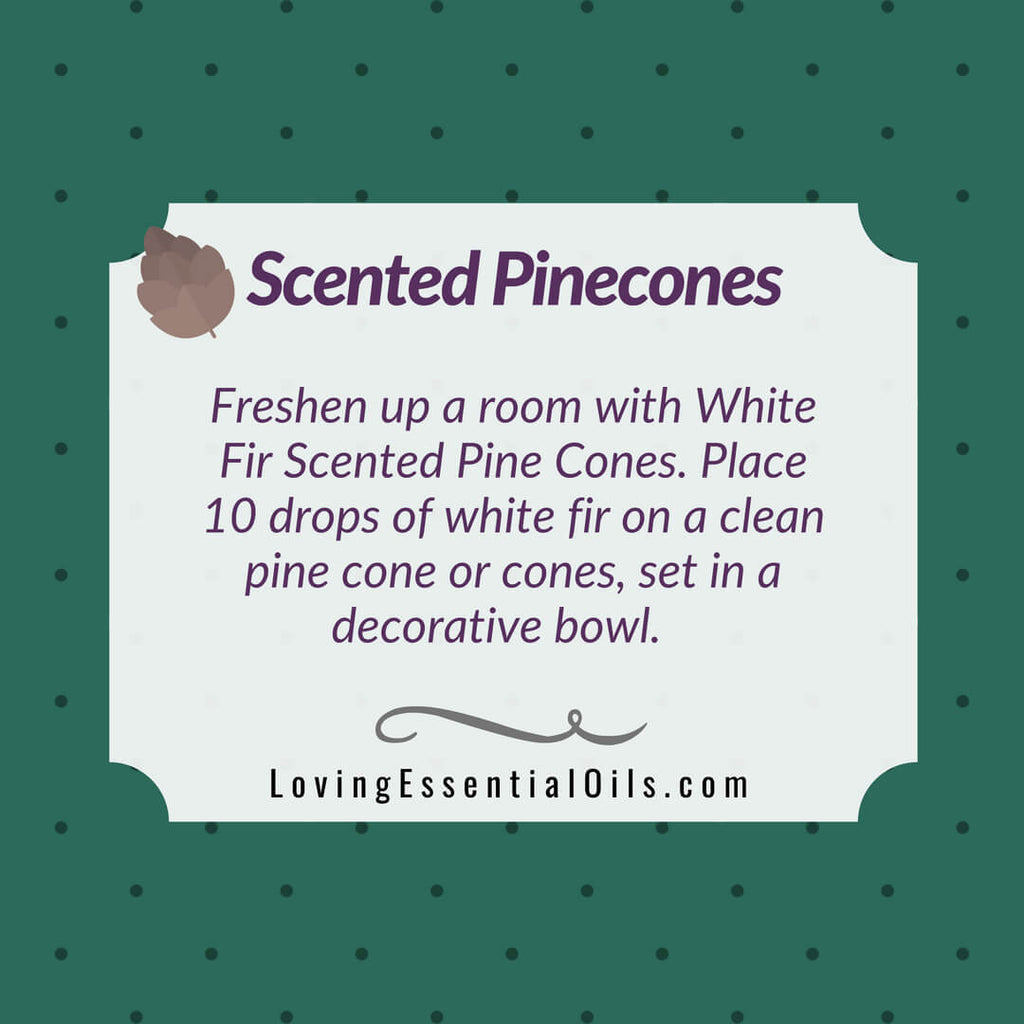
White Fir Essential Oil Substitutions
Can’t Find White Fir Essential Oil? White fir essential oil (Abies alba) has a clean, crisp smell that’s perfect for diffusing during the holidays. But what do you do if you can’t find it? Luckily, there are plenty of substitutes that can achieve a similar effect. Keep reading to learn more about white fir essential oil and some of the best substitutes for it.
White Fir Therapeutic Substitutions
If you’re having trouble finding white fir essential oil, here are some substitutes that can achieve a similar effect:
1. Pine Essential Oil
Pine essential oil is derived from the needles of pine trees and has a fresh, woody aroma that’s very similar to white fir. Pine essential oil can be used in diffusers, homemade cleaning products, and DIY skincare recipes.
2. Cypress Essential Oil
Cypress essential oil has a slightly sweet, woody smell that’s reminiscent of evergreens. It’s often used in diffusers during the winter months to boost energy levels and chase away holiday blues. Cypress essential oil can also be used topically to improve circulation and reduce inflammation.
3. Bergamot Essential Oil
Bergamot essential oil has a citrusy smell with notes of floral and woody scents. It’s often used in diffusers to boost mood and energy levels. Bergamot essential oil can also be used topically to fight acne and soothe irritated skin.
4. Juniper Berry Essential Oil
Juniper berry essential oil has a fresh, clean aroma with slight woody undertones. It’s often used in diffusers to purify the air and boost immunity during cold and flu season. Juniper berry essential oil can also be used topically to fight inflammation and improve circulation.
5. Eucalyptus Essential Oil
Eucalyptus essential oil has a strong, minty smell with slight floral undertones. It’s often used in diffusers to clear sinuses and ease respiratory congestion. Eucalyptus oil can also be used topically to relieve muscle pain and inflammation.
6. Lavender Essential Oil
Lavender essential oil has a sweet, floral fragrance that’s widely known for its calming properties. It’s often used in diffusers to relieve stress and promote relaxation. Lavender oil can also be used topically to soothe irritated skin and reduce inflammation.
There are plenty of substitutes for white fir essential oil that can achieve a similar effect—pine, cypress, bergamot, juniper berry, eucalyptus and lavender essential oils are all great options!
White Fir Aromatic Substitutions
To substitute the aroma, try another conifer oil like one of these:
- Pine essential oil
- Balsam Fir essential oil
- Douglas Fir essential oil
So if you’re having trouble finding white fir, don’t despair—one of these oils will likely work just as well.
White Fir Diffuser Blend Recipe
Forest Rainfall – White Fir Diffuser Oil
This citrus and fir blend smell just exceptional together, give this diffuser recipe a try:
- 3 drops Grapefruit essential oil
- 3 drops White Fir essential oil
- 2 drops Lavender essential oil
- 2 drops Lemon essential oil
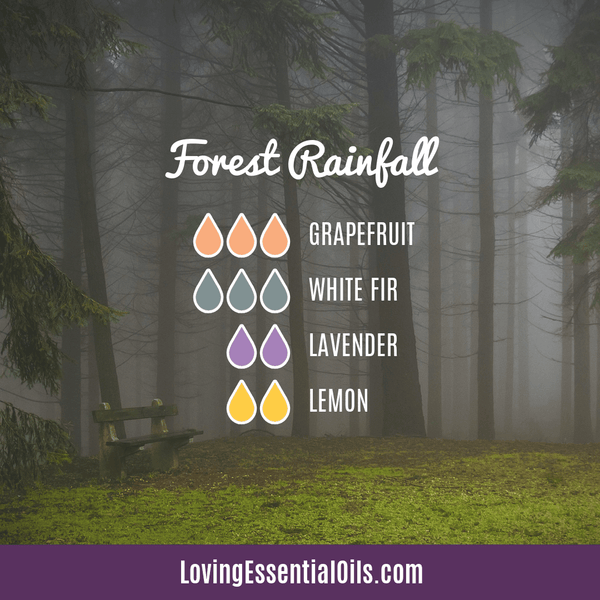
Where to Buy White Fir Essential Oil?
Buy only high quality, 100% pure essential oils when purchasing. If you are looking to buy fir essential oil, here are some brands we like:
General Essential Oil Precautions
Never use essential oils undiluted, in eyes or mucous membranes. Do not take internally unless working with a qualified practitioner. Keep out of reach from children.
Use essential oils with extreme caution on children, be sure you have researched the oil and that it is safe for use on kids. Plant Therapy clearly labels their oils “KidSafe” on the bottle if the oil can be used for children ages 2–10.
If applying an essential oil topically (on your skin), you may perform a small patch test to an insensitive part of the body, use 1-2 drops in a teaspoon of carrier oil like jojoba oil, read more here.
If you are pregnant, breastfeeding, epileptic, or under a doctor’s care, consult your physician. For more information on oil safety issues here.
DIY Oily Guide with White Fir Recipe
Aromatherapy and Essential Oils Guide by Jennifer Lane, Loving Essential Oils Owner & Certified Aromatherapist:
Frequently Asked Questions about White Fir Oil Blends
Here are some common FAQs for white fir tree oil:
What is white fir essential oil used for?
White fir essential oil is commonly used for its therapeutic properties such as providing respiratory support and reducing feelings of stress and anxiety. Additionally, it is often utilized in aromatherapy to promote relaxation and create a calming atmosphere.
What types of fir essential oils are available?
When selecting an essential oil from the various fir options available:
- Fir Needle
- Silver Fir/White Fir
- Fir Balsam
It is important to note that Douglas Fir isn’t actually a true fir.
Each of these oils has unique properties and benefits so consider carefully before making your choice. Take into account factors such as scent preference, intended use and any health concerns when deciding which one will work best for you.
What are the main constituents of White Fir Essential Oil?
The main constituents of White Fir Essential Oil primarily include pinene and bornyl acetate, which contribute to its characteristic aroma and potential therapeutic benefits. These compounds are responsible for its refreshing and uplifting scent, as well as its potential antimicrobial and anti-inflammatory properties.
What are the properties of White Fir Essential Oil?
White Fir Essential Oil possesses various beneficial properties, including its ability to promote relaxation and improve respiratory health. Additionally, it is known for its antiseptic and anti-inflammatory effects.
What is the shelf life of White Fir Essential Oil?
The shelf life of White Fir Essential Oil is typically around 2 to 3 years if stored properly in a cool, dark place. However, its effectiveness and aroma might gradually diminish over time.
What are White Fir Essential Oil emotional benefits?
White Fir is a powerful essential oil that can bring about feelings of security and peace. When diffused or inhaled it has the ability to promote self confidence while also providing calmness and relaxation. Its perfect for use at home, as well as after exercise. When massaged into skin, it offers comfort both physically and mentally.
Share on Pinterest
